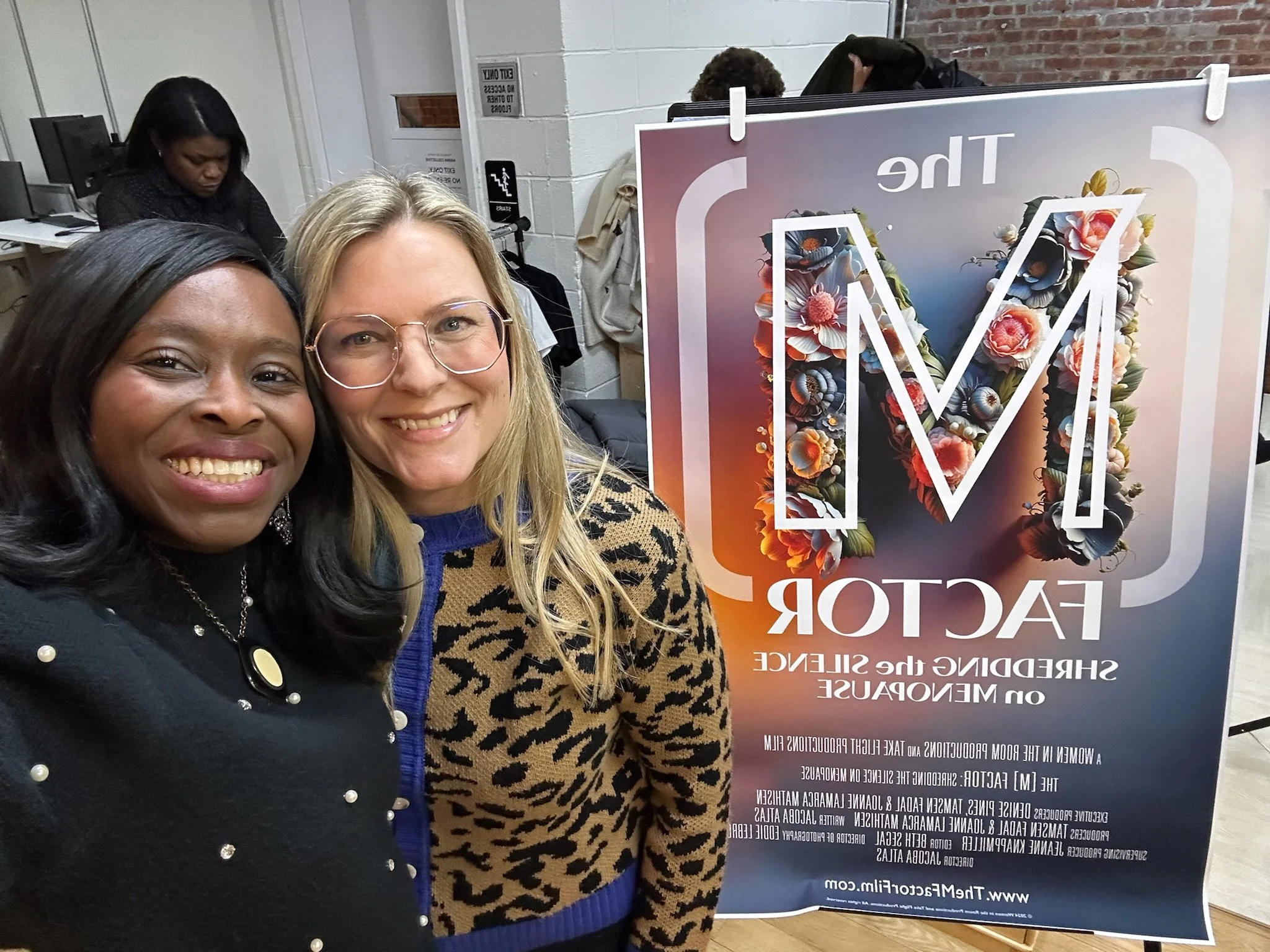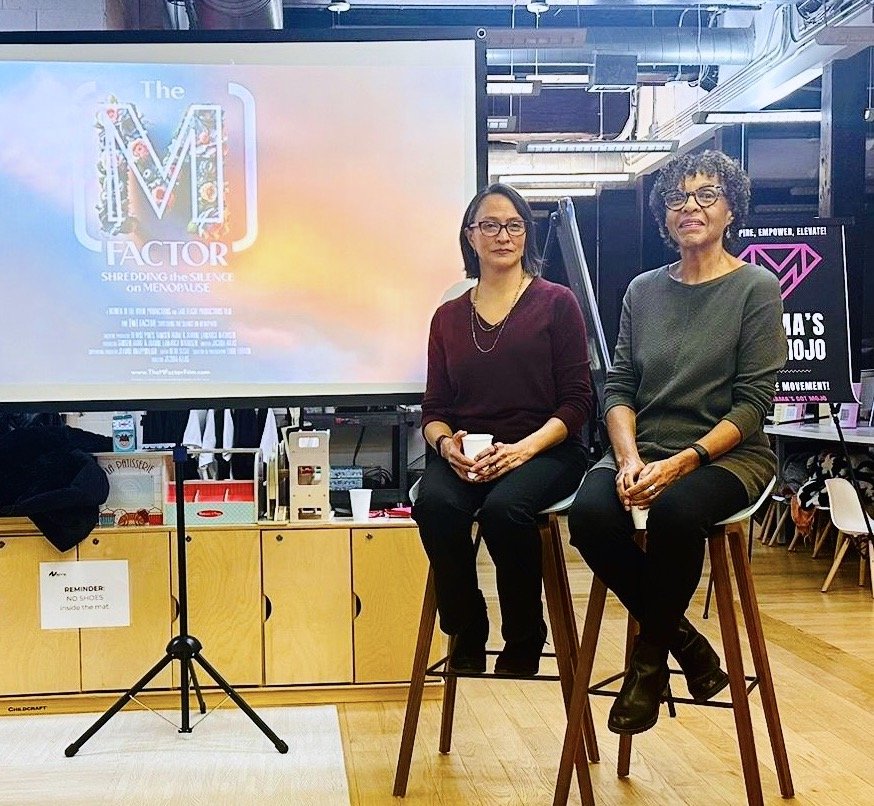Breaking the Silence on Menopause: Highlights from the M Factor Watch Party





























Shredding the Silence on Menopause: A Recap of The M Factor Film Screening
For centuries, menopause has been a topic cloaked in silence and misunderstanding. But times are changing, and women are speaking up. Over the past year, the conversation around perimenopause and menopause has gained tremendous momentum, with women seeking to better understand the changes their bodies go through in this life stage.
At Mama’s Got Mojo, we believe every woman deserves to live healthily and vibrantly through the last third of her life, and knowledge is the cornerstone of that empowerment. This is why we were so thrilled to host a screening of The M Factor Film – Shredding the Silence on Menopause.
The event was held in the beautiful coworking space provided by our generous sponsor, Narra Collective, in Jersey City, and the demand for seats was overwhelming. It was heartening to see so many moms prioritize their well-being and show up to learn more about a subject that has been overlooked for far too long.
About the Film
The M Factor Film brought critical insights to light, exploring the challenges and realities of menopause while offering a roadmap for women to thrive during this time.
The number one takeaway from the film was this: Hormone Replacement Therapy (HRT) is safe for the vast majority of women, and the risks of not using HRT outweigh the risks of being on it.
A faulty study from the early 2000s, known as the Women’s Health Initiative (WHI), created widespread fear about HRT, incorrectly linking it to cancer and cardiovascular risks.
This misinformation has been thoroughly debunked for many years, but its impact led to an entire generation of women unnecessarily suffering through symptoms and health challenges that could have been mitigated.
The film emphasized that HRT is not just about alleviating symptoms like hot flashes and night sweats—it’s also a powerful tool for protecting against long-term health risks, such as osteoporosis, heart disease, and cognitive decline. With proper guidance, HRT can significantly improve the quality of life for menopausal women.
Other critical insights from the film included:
80% of women experience menopausal symptoms, but only a fraction seek treatment due to stigma and lack of information.
Perimenopause can begin as early as a woman’s mid-30s, often overlapping with postnatal recovery, creating a “perfect storm” of hormonal upheaval.
Without proper intervention, women face an increased risk of osteoporosis, cardiovascular disease, and mental health challenges during menopause.
Key Takeaways from the Panel Discussion
Following the screening, we hosted a dynamic panel discussion featuring four certified menopause specialists:
Dr. Potter-McQuilkin, MD: OBGYN & Lifestyle Medicine expert
Mary Vidal: Certified Menopause Fitness & Health Coach
Laura Lacey: Certified Nutritionist and Menopause Health Coach
Doucky Esquijarosa: Fitness, Nutrition, and Menopause Coach
Dr. Potter-McQuilkin: Defining Menopause and Understanding HRT vs. MHT
Dr. Potter began by clarifying key terms every woman should know:
Perimenopause: The transitional phase leading up to menopause, marked by fluctuating hormone levels. This stage can last up to 10 years and is often accompanied by symptoms such as irregular periods, mood swings, and sleep disturbances.
Menopause: A single point in time defined as 12 consecutive months without a menstrual period. This milestone typically occurs around age 51.
Post-menopause: The years following menopause, during which some symptoms may continue but often stabilize. This phase is permanent, as the body no longer produces significant amounts of estrogen or progesterone.
Dr. Potter then explained the difference between Hormone Replacement Therapy (HRT) and Menopausal Hormone Therapy (MHT):
HRT is primarily designed for younger women who enter menopause prematurely (typically in their 40s or earlier). It involves higher doses of estrogen to replace what the body would naturally produce before the natural age of menopause, restoring hormone levels to a pre-menopausal state.
MHT, on the other hand, is tailored for women experiencing menopause or post-menopause. It uses lower doses of hormones to specifically address menopausal symptoms like hot flashes, brain fog, and sleep disturbances. Beyond symptom relief, MHT offers significant health benefits, including improved bone density, reduced cardiovascular risk, and enhanced quality of life.
She reiterated the importance of consulting a menopause specialist to determine the most appropriate therapy for each woman’s unique needs.
Laura Lacey: Nutrition Over Supplements
Laura addressed the overwhelming marketing of menopause supplements, advising women to focus on nutrition first. She recommended:
Vitamin D for bone health
Magnesium for better sleep and muscle recovery
Omega-3 fatty acids for heart health
Fiber to support digestion and hormonal balance
Doucky Esquijarosa: Lifestyle Changes That Work
Doucky shared her personal experience with perimenopause and how she regained energy and balance by focusing on lifestyle adjustments. Key points included:
Cortisol spikes during hormonal shifts can increase stress and worsen anxiety.
Insulin resistance caused by declining estrogen can make weight management more difficult.
Weight training is crucial for combating sarcopenia (age-related muscle loss), which occurs at a rate of 3-5% annually during midlife.
Doucky’s advice? Traditional weight-loss methods, like calorie deficits, often fail women during perimenopause. Instead, prioritize sleep hygiene, manage stress, and focus on strength-building exercises.
Mary Vidal: The Five Pillars of Menopause Wellness
Mary outlined her holistic framework for thriving through menopause:
Movement & Exercise: Focus on daily walking and weight training instead of long cardio sessions.
Nutrition: Emphasize whole, nutrient-dense foods over processed options.
Sleep: Create consistent routines to promote restful sleep.
Stress Management: Incorporate mindfulness and relaxation techniques to reduce cortisol levels.
Social Connection: Build and nurture relationships to support emotional well-being.
Audience Engagement and Next Steps
The Q&A session that followed was filled with insightful questions, from managing less common symptoms to balancing work and family while navigating menopause. It was clear that this is a conversation women are eager to continue.
We’re already brainstorming future events to deepen the conversation and provide even more tools and support to our growing community.
A Heartfelt Thank You
We extend our gratitude to the incredible women who joined us, the knowledgeable panelists, and our sponsor, Narra Collective, for making this event possible. Together, we are shredding the silence on menopause and empowering women to take charge of their health and well-being.
Stay Connected
Follow us on Instagram at @mamasgotmojo, sign up for our newsletter, and visit us at www.mamasgotmojo.com to stay informed about upcoming events.
Here’s to embracing this stage of life with strength, knowledge, and support. See you at the next event!
